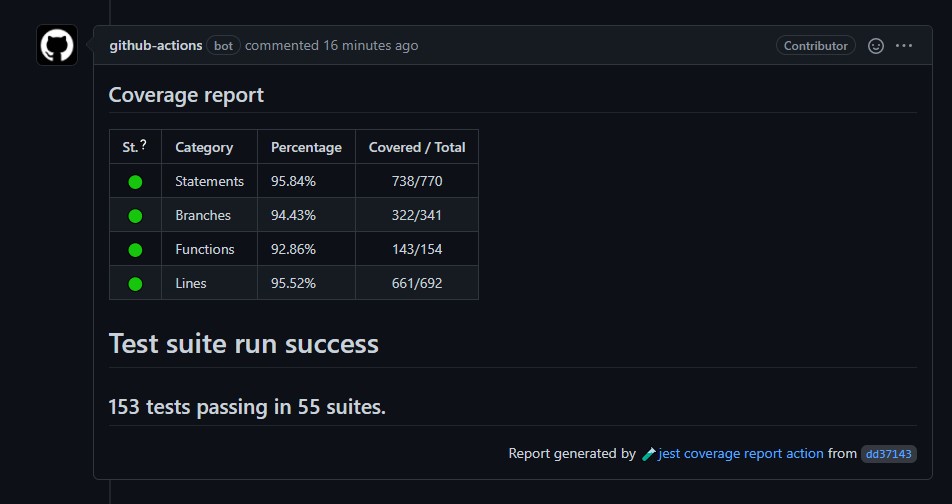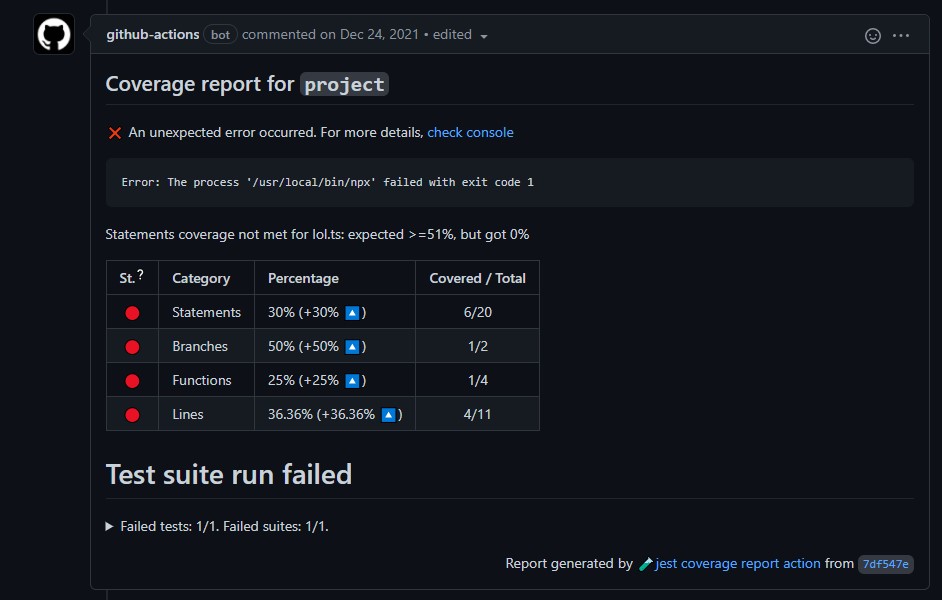A GitHub action that reports about your code coverage in every pull request.
This action uses Jest to extract code coverage, and comments it on pull request. Inspired by Size-limit action. Features:
- Reporting code coverage on each pull request. 📃
- Rejecting pull request, if coverage is under threshold. ❌
- Comparing coverage with base branch. 🔍
- Showing spoiler in the comment for all new covered files. 🆕
- Showing spoiler in the comment for all files, in which coverage was reduced. 🔻
- Failed tests & uncovered line annotations 📢
- Install and configure Jest.
- Create new action inside
.github/workflows:
Minimal configuration
name: 'coverage'
on:
pull_request:
branches:
- master
- main
jobs:
coverage:
runs-on: ubuntu-latest
steps:
- uses: actions/checkout@v3
- uses: ArtiomTr/jest-coverage-report-action@v2- Pay attention to the action parameters. You can specify custom threshold or test script
- That's it!
If you're seeing this error in your action's console:
HttpError: Resource not accessible by integration
at /home/runner/work/_actions/ArtiomTr/jest-coverage-report-action/v2/dist/index.js:8:323774
at processTicsAndRejections (node:internal/process/task_queues:96:5)
at async /home/runner/work/_actions/ArtiomTr/jest-coverage-report-action/v2/dist/index.js:64:2535
at async Ie (/home/runner/work/_actions/ArtiomTr/jest-coverage-report-action/v2/dist/index.js:63:156)
at async S_ (/home/runner/work/_actions/ArtiomTr/jest-coverage-report-action/v2/dist/index.js:64:2294)
It means that action is running with low privileges. By default, pull_request event doesn't have any write permissions, when PR is coming from fork. To fix that, change trigger action to pull_request_target:
name: 'coverage'
on:
pull_request_target:
branches:
- master
- main
jobs:
coverage:
runs-on: ubuntu-latest
steps:
- uses: actions/checkout@v3
- uses: ArtiomTr/jest-coverage-report-action@v2Warning
This brings worse DX - you can test action only when it is merged into your main branch. Any changes to the workflow file will be taken only after merging them to the main branch
By default, this action takes github.token variable to publish reports on your PR. You can overwrite this property by specifying:
with:
github-token: ${{ secrets.SECRET_TOKEN }}This action automatically suports jest's coverageThreshold property.
Just add into your jest.config.js file:
module.exports = {
coverageThreshold: {
global: {
lines: 80,
},
},
};If you want to run this action in custom directory, specify working-directory:
with:
working-directory: <dir>This action automatically adds necessary flags to your test script. The default script is:
npx jest
So you don't need to specify additional flags - action will handle them automatically. So, after adding necessary flags, action will run this command:
npx jest --ci --json --coverage --testLocationInResults --outputFile=report.json
But you do not need to specify these flags manually. Also, you can use different package manager, yarn for example:
with:
test-script: yarn jestOr, if you would like to run a script from your package.json:
with:
test-script: npm testBy default, this action will install your dependencies using npm. If you are using yarn or pnpm, you can specify it in the package-manager option:
with:
package-manager: yarnor
with:
package-manager: pnpmTo bypass running unit tests, you can pass the filepath to the current report.json
with:
coverage-file: ./coverage/report.json
base-coverage-file: ./coverage/master/report.jsoncoverage-fileis the filepath to the JSON coverage report for the current pull request.base-coverage-fileis the filepath to the JSON coverage report from the branch your pull request is merging into.
For example, you can save every test run to an artifact and then download and reference them here.
You can opt-out coverage comparison features to speed-up action. To achieve this, firstly, manually collect coverage to report.json file. Then, specify these options for the action:
with:
coverage-file: report.json
base-coverage-file: report.jsonNote: this option affects only coverage for the "head" branch. For skipping steps of "base" branch, see
base-coverage-fileoption.
By default, this action will install dependencies and run the tests for you, generating the coverage report. Alternatively, you can skip these steps using the skip-step option.
with:
skip-step: allAccepted values are:
none(default) - all steps will be runinstall- skip installing dependenciesall- skip installing dependencies and running the test script
To change annotations, you have to set the annotations option as shown below:
with:
annotations: noneAccepted values are:
all(default) - Will annotate sections of your code that failed tests or test did not covernone- Turns off annotationscoverage- Will annotate those sections of your code that test did not cover. Limited to changed lines when used on a Pull Requestfailed-tests- Will annotate those sections of your code that failed test
By default, action attaches comment to a pull request or commit. However, if you want to use other action for publishing report, you can specify output: report-markdown:
- uses: ArtiomTr/jest-coverage-report-action@v2
# give the id for the step, to access outputs in another step.
id: coverage
with:
# tell to the action to not attach comment.
output: report-markdown
- uses: marocchino/sticky-pull-request-comment@v2
with:
# pass output from the previous step by id.
message: ${{ steps.coverage.outputs.report }}Also, you can use this data on other platforms. For instance, you can send report to your Slack or Jira.
Note: Working examples of integrations with different platforms are much appreciated! Feel free to open a PR.
Available options are:
comment- Attach comment to PR or commit, depending on event type, which triggered an action.report-markdown- Generate output "report", with report contents in markdown format.
Also, you can combine these options:
with:
# This will attach comment to a PR and generate markdown output.
output: comment, report-markdownIf you are using the push event to trigger this action, by default it does not know which PR to comment on or the base branch of the PR to compare code coverage with.
You can pass the prnumber to the action so that coverage change can be run and comments will be updated on each push, instead of creating a new comment with each run of the action.
You can find the PR number with a number of methods, the jwalton/gh-find-current-pr action makes it easy:
name: 'coverage'
on:
push:
branches:
- master
- main
jobs:
coverage:
permissions:
checks: write
pull-requests: write
contents: write
runs-on: ubuntu-latest
steps:
- uses: actions/checkout@v1
- uses: jwalton/gh-find-current-pr@v1
id: findPr
- uses: ArtiomTr/jest-coverage-report-action@v2
with:
prnumber: ${{ steps.findPr.outputs.number }}Pull requests are welcome. For major changes, please open an issue first to discuss what you would like to change.
Please make sure to update tests as appropriate.
Jest Coverage Report action is made with <3 thanks to these wonderful people (emoji key ✨):
MIT © Artiom Tretjakovas



